South Africa ready for Olympic 'battle' with Nigeriapublished at 16:20 BST 4 April 2024
South Africa coach Desiree Ellis warns a "tough battle" awaits in their two-legged Olympic Games qualifier against Nigeria.
Read MoreThis is an automated feed overnight and at weekends
South Africa coach Desiree Ellis warns a "tough battle" awaits in their two-legged Olympic Games qualifier against Nigeria.
Read MoreThe socialite is accused of throwing money at a film premiere in Lagos, which is technically an offence.
Read MoreThe unnamed woman died of her injuries after an elephant flipped her car over several times.
Read MoreThe soccer star was waiting to be served at a petrol station when two gunmen opened fire on him, police say.
Read MoreOpposition groups fear that the new constitution will allow President Faure Gnassingbé to stay in power.
Read MoreMany migrants risk all to reach South Africa, where their presence has become a hot election issue.
Read MoreWe'll be back on Friday
That's all for now from the BBC Africa Live team - we're back on Friday.
There'll be an automated service here in the meantime and you can find the latest updates on the BBC News website, or on our Focus on Africa and Africa Daily podcasts.
A reminder of Wednesday's wise words:
Quote MessageOne frog can ruin everyone's water."
A Luo proverb sent by Ronald Ogwal in Uganda
Click here to send us your African proverbs.
And we leave you with this photo of South Africa's Bradley Cox competing in the World Rally-Raid Championship:
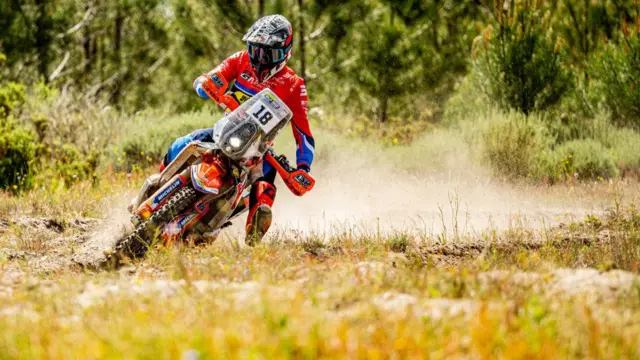 Image source, Getty Images
Image source, Getty ImagesPhotos documenting the after-effects of Ethiopia's civil war in Tigray, the perception of disability in Madagascar, migration from Mauritania and unemployment in Tunisia have won awards for "documenting some of the most pressing issues facing the world today".
The photographers behind these four projects were among those who scooped regional prizes in the annual World Press Photo competition.
Four global winners will be announced on 18 April.
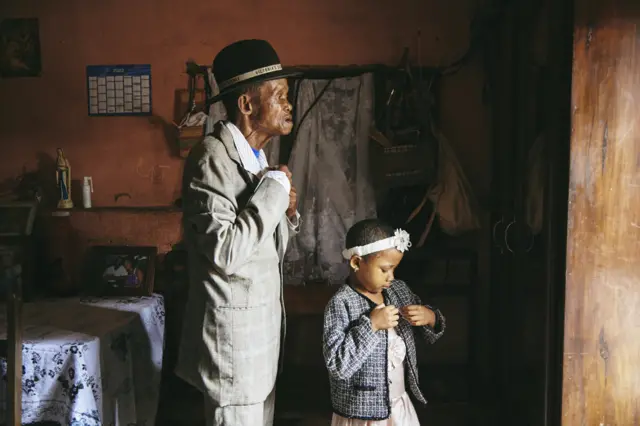 Image source, Lee-Ann Olwage/World Press Photo
Image source, Lee-Ann Olwage/World Press PhotoValim-babena (the duty of grown children to help their parents) by Lee-Ann Olwage: "Dada Paul and his granddaughter Odliatemix get ready for church in Antananarivo, Madagascar. He has lived with dementia for 11 years. For much of that time his family assumed he had 'gone mad' or attributed the symptoms to alcohol consumption. Only his daughter Fara noticed something different and continued caring for him."
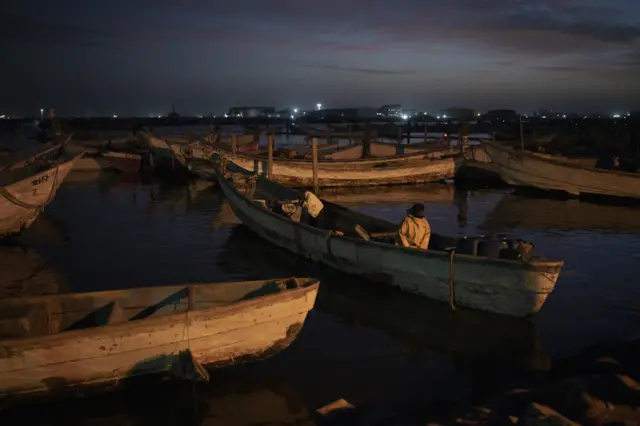 Image source, Felipe Dana and Renata Brito/World Press Photo
Image source, Felipe Dana and Renata Brito/World Press PhotoAdrift by Felipe Dana and Renata Brito: "Adrift is a digital investigation that combines writing, photography, video and graphics into an immersive presentation that retraces the voyage of 43 people lost in the Atlantic as they tried to reach Europe. The project is accompanied by a 13-minute short documentary that takes viewers behind the scenes of the two-year-long investigation."
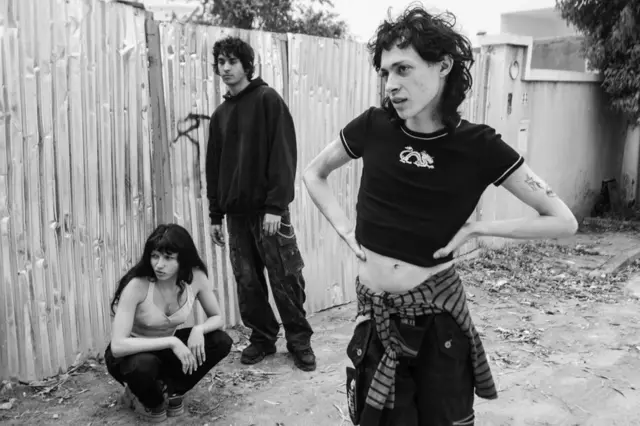 Image source, Zied Ben Romdhane/World Press Photo
Image source, Zied Ben Romdhane/World Press PhotoThe Escape by Zied Ben Romdhane: "Youths watch a soccer game near a chemical plant in Chott-Essalam, Gabès, Tunisia. Nearly 5,000 people work in the region’s chemical industry, but new hires from the region are low. In Gabès, unemployment stands at 24% overall and more than 50% among young people, according to figures reported in 2021 by non-profit newsroom Coda Media."
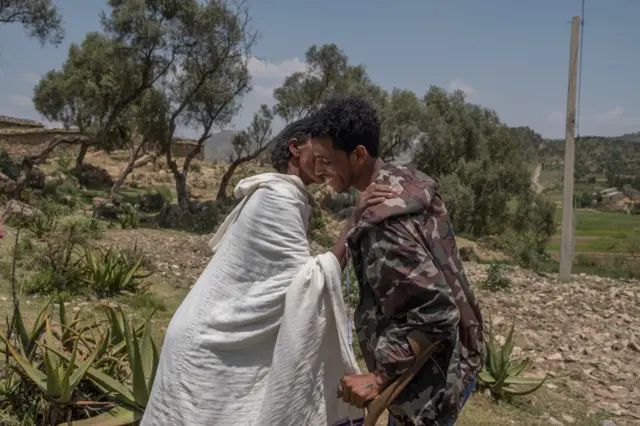 Image source, Vincent Haiges/World Press Photo
Image source, Vincent Haiges/World Press PhotoReturning Home from War by Vincent Haiges: "Kibrom Berhane (24) greets his mother for the first time since he joined the Tigray Defence Forces, two years earlier... He fought until wounded by a grenade, losing his leg, a month before the peace agreement. Impressed by Kibrom's determination to return to his everyday life, the photographer wanted to show the aftermath of the war, revealing its hidden consequences."
Some fear that the drought sweeping southern Africa will be one of the worst in decades.
Read MoreJanet Ball & Mpho Lakaje
BBC's Africa Daily podcast
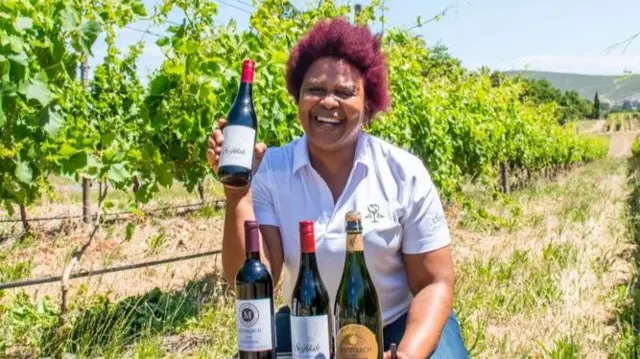 Image source, On Cloud Wine
Image source, On Cloud WineNondumiso Pikashe was told: "Black brands don't sell"
South Africa is one of the top wine producers in the world yet, nearly 30 years after the end of apartheid, the industry is still dominated by white-owned wineries.
Black-owned brands account for less than 1% of wine sales per litre in South Africa, even though black South Africans make up over 80% of the population.
A determined group of black women winemakers wants to change this.
Vivian Kleyhans, who founded her brand Seven Sisters Vineyard in 2005, told the BBC's Africa Daily podcast about the challenges she faced back then.
"After 1994 to about 2000-2002 it was still very much apartheid years. And in those years policies were changed to include people of colour in the industry.
"We really had to investigate this opportunity and our involvement in a very white, male-dominated industry.
“We did not belong to the wine industry. It belonged to a minority group of people."
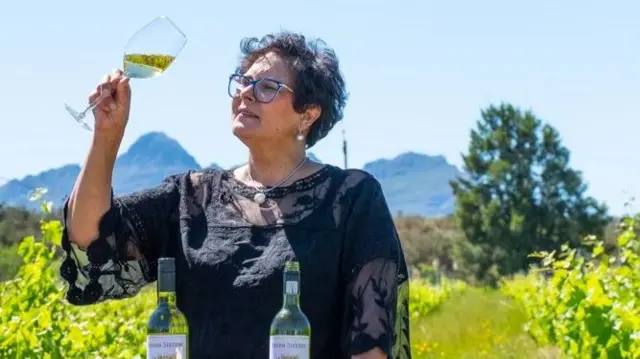 Image source, On Cloud Wine
Image source, On Cloud WineVivian Kleyhans founded her brand almost two decades ago
After facing too many obstacles within South Africa, Ms Kleyhans found an importer in the US who agreed to sell her wines there.
"I’m still not selling my wines in the local market. I’ve decided if I want to make money it’s not going to be in the local market,” she said.
Other black women winemakers say they have also struggled to sell their products in South Africa.
Now, a group of them, including Ms Kleyham, have been given financial support to export their wines from British company On Cloud Wine.
Among the winemakers who has benefited is Nondumiso Pikashe, who has been in the business for 20 years.
“You have not been exposed to the world of wine your whole life so you have to dig deep and rely on your confidence, because you also don’t have networks in that space," said Ms Pikashe, owner of Ses'fikile Wines.
"It was up to me to feel unintimidated and say, despite the huge challenges ‘I can still overcome.'"
A historian is trying to piece together the puzzle of what happened to an infamous piece of history.
Read MoreEarlier we reported that Uganda's Constitutional Court had rejected a bid to overturn a controversial anti-gay law adopted in May last year.
The BBC has since spoken to a member of one of the groups which had challenged the law, arguing that the legislation violated fundamental rights guaranteed by Uganda’s constitution.
Nicholas Opiyo, a lawyer, said: "The court decided today that it is legal and lawful to discriminate against LGBTQ people. The court today decided that it is legal to exclude the LGBTQ community from participating in the affairs of their country, simply on the basis of public sentiment and alleged cultural values."
Steven Kabuye, an activist who fled Uganda after being stabbed in what some deemed to be a homophobic attack, also condemned Wedneday's ruling.
"My heart weeps for those that are still back in Uganda," he told the BBC from his new home in Toronto, Canada.
"They have to stay as safe as possible. They have to hide themselves away. Those who haven't [managed to escape] are really, really in danger."
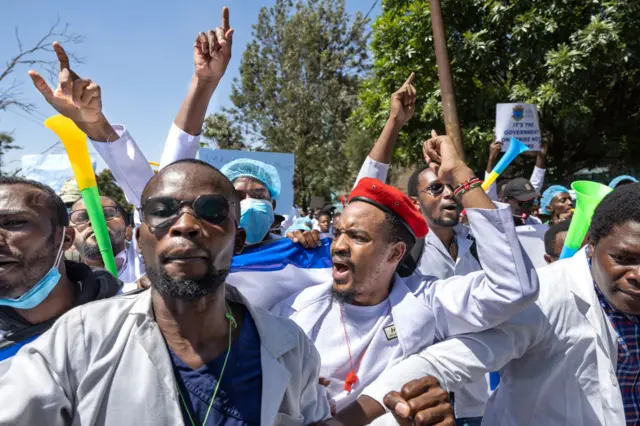 Image source, AFP
Image source, AFPThe strike has disrupted healthcare services for weeks
Kenyan doctors working in public hospitals have rejected a government offer aimed at ending a weeks-long strike that has hampered health services.
The Kenya Medical Practitioners, Pharmacists and Dentists Union (KMPDU) went on strike on 14 March over the non-payment of salary arrears, delays by the government to deploy medical interns and other grievances.
Late on Tuesday, the government asked the doctors to end their strike, saying the salary arrears have been paid and that trainee doctors would be hired from Thursday this week.
"We decline these proposals in total," KMPDU chairman Abidan Mwachi responded on social media platform X, external.
He said the government's offer does not "honour" a collective bargaining agreement that was signed in 2017, when a separate doctors' strike lasted for three months.
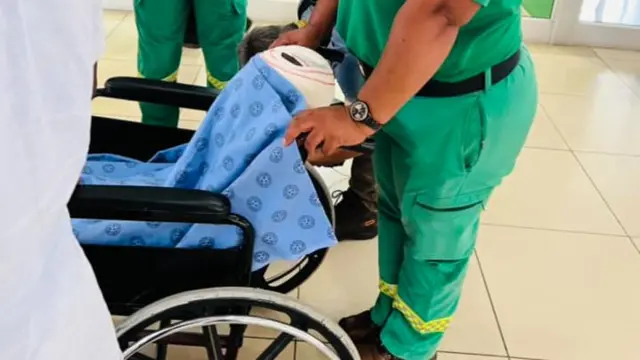 Image source, Limpopo Health Department/Facebook
Image source, Limpopo Health Department/FacebookThe eight-year-old was hospitalised with serious injuries
An eight-year-old girl, the only passenger who survived after a bus plunged off a bridge in South Africa, has left hospital and flown back to her home country.
Forty-five pilgrims were travelling from Botswana's capital, Gaborone, to an Easter service in the South African town of Moria when their vehicle crashed through a barrier and caught fire upon hitting the ground some 50m (165ft) below.
The surviving girl was hospitalised with serious injuries. She is now in a stable condition.
Health authorities in the north-eastern Limpopo province, where the crash took place, said the girl flew from Polokwane Airport on Wednesday morning.
Pictures posted by the authorities on Facebook show the girl being transported to her flight via wheelchair. A blanket covers her face and she appears to have a bandage wrapped round her head.
In one image, a teddy bear rests on her lap.
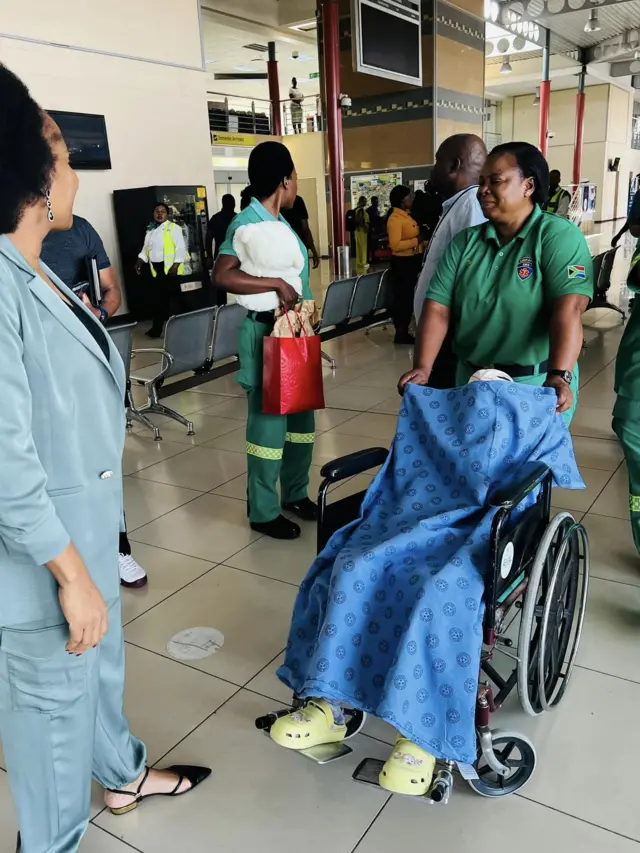 Image source, Limpopo Health Department/Facebook
Image source, Limpopo Health Department/Facebook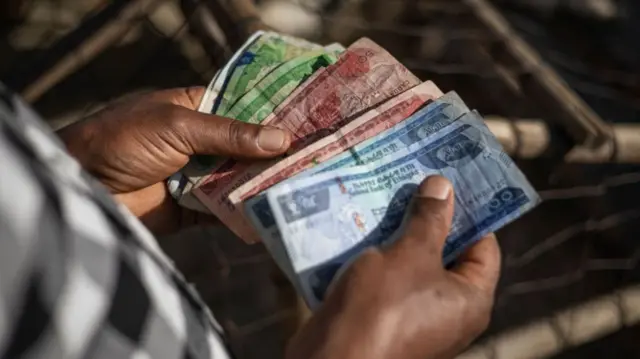 Image source, AFP
Image source, AFPEthiopia's economic woes have been worsened by the Covid pandemic and back-to-back conflicts
A team from the International Monetary Fund (IMF) visited Ethiopia to discuss the country's request for financial support, but left without reaching a deal.
The IMF said in a statement that it however "made substantial progress" in establishing how it could support the country's economic programme.
Discussions with Ethiopia's authorities will continue later this month, said the team's head, Alvaro Piris.
Ethiopia is on the verge of an economic crisis after defaulting on a $33m (£26m) interest payment that was due in December.
The Paris Club - a group of creditor nations - set a condition for Ethiopia to secure an IMF loan by the end of March in order to maintain a debt-servicing deal that gives the country repayment relief until next year.
The East African country's economic difficulties were worsened by the Covid pandemic and back-to-back conflicts.
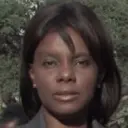 Shingai Nyoka
Shingai Nyoka
BBC News, Harare
Zimbabwe has declared a state of disaster over a drought that has left around three million people facing hunger - making it the third country in southern Africa to raise the alarm.
Poor rains have wrought havoc across much of the region, where according to the UN's World Food Programme 20 million people don't have regular access to nutritious food.
Zimbabwe's President Emmerson Mnangagwa said the country needs $2bn (£1.6bn) to combat the effects of food insecurity within its borders.
Much like in neighbouring Zambia and Malawi, which have also declared states of disaster and emergency, low rainfall has wiped out about half of Zimbabwe's maize crop – the nation's staple food.
The grain shortage has subsequently pushed up food prices.
Zimbabwe now joins the regional scramble to find maize on the international market.
The authorities say that the number of people needing food aid will be higher than an initial projection of 2.7 million.
Germany wants tougher limits on hunting the animals, but Botswana says it has too many of them.
Read MoreCameroon's football federation expresses its "great astonishment" after the country's sports ministry appoints Marc Brys.
Read MoreNigeria's tax agency has apologised over an Easter message that was criticised as offensive and disrespectful by some Christians in the country.
The Federal Inland Revenue Service (FIRS) on Sunday shared a post on X saying: "Jesus paid your debts, not your taxes", local media reported.
The now-deleted post was denounced by a number of Christian organisations, which demanded that the tax agency apologise.
The Christian Association of Nigeria (CAN), an umbrella group, said the message was “offensive and derogatory to the Christian faith”.
The association's National Director Abimbola Ayuba also complained that the post continued a pattern of "provocative messages around religious holidays".
In the apology issued on Tuesday, FIRS spokesperson Dare Adekanmbi said the post was not intended to detract from the significance of Easter.
"The message was our way of uniquely engaging taxpayers and to remind them of the need to prioritise payment of their taxes as a civic obligation," he added.
Christianity is one of Nigeria's main religions and is practiced by nearly half of the country.
Bassirou Diomaye Faye, Senegal's fifth president, has been sworn into office at a ceremony in the capital, Dakar.
Read More